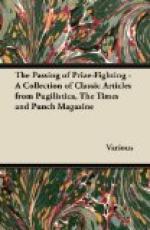[Illustration: A QUEUE FOR THE COMMONS.]
Mr. HOGGE is usually so assiduous in his attendance that I was surprised at his sudden departure just before Sir C. KINLOCH-COOKE put a question to the FOOD CONTROLLER. But when I found that the question related to “the political as well as the economic effect of the new regulation governing the sale of pigs” I recognised the delicacy of his action in withdrawing. Mr. CLYNES, however, had nothing to say on the political aspect of the question; and shortly afterwards Mr. HOGGE reappeared.
The Members whose interrogatory activities it is sought to curb are, for the most part, like the objects in a museum, more curious than exhilarating; but there are some, I am afraid, whose questions are intentionally mischievous, and by their mere appearance on the notice-paper give comfort and even information to our foes. Mr. BONAR LAW’S announcement that the Government would, during the Christmas holidays, consider how to mitigate the nuisance met with noisy objection from Mr. LYNCH, Mr. PRINGLE and other Members. The most original contribution to the discussion came from Mr. HOLT, who innocently inquired whether the Government would mind laying before the House a statement of the harmful questions which had been asked. Possibly he was thinking of the famous edition of MARTIAL in which all epigrams of doubtful propriety were excluded from the main text and collected in the appendix.
The SECRETARY for SCOTLAND, speaking at break-neck speed, managed to give the House within the space of ten minutes an outline of the Bill which he hopes will maintain for Scotland her primacy in education. The new MUNRO doctrine did not, however, appeal to everybody, and there were ominous cries of dissent when he announced his intention of disestablishing the School Boards and putting the denominational schools on the rates.
Lord RHONDDA listened from the Peers’ Gallery to the debate on Food Control, and received a quantity of advice which should help him to mind his p’s and q’s, particularly the latter. His lieutenant, Mr. CLYNES, improved the reputation that he has already acquired at Question-time, and was able to bring a little personal experience to bear upon the most vexed question of the day. “Members of my own household,” he said, “have stood in these queues, and I know something of their hardships.” That is why, no doubt, he has urged upon his chief the formation of a Consumers’ Council, to aid the Ministry in its deliberations. Mr. TILLETT seized the opportunity to make his maiden speech, and reminded the House that when they talked of queues at home they should not forget those other queues in the trenches. For the sake of the men who had lined up in our defence it was for us to see that their wives and children got their proper supply of food.
Tuesday, December 18th.—It was curious to hear Mr. LEES-SMITH, that stickler for freedom of expression, complaining that a London paper had published an article attacking M. CAILLAUX; and the House was amused by Lord ROBERT CECIL’S suggestion that the hon. Member should furnish him with ideas for the more stringent control of newspapers.




